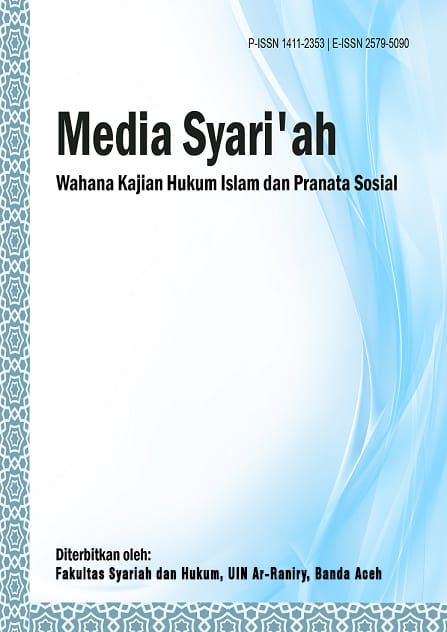Publikasi Pelaku Jarimah dan Tindak Pidana Pers dalam Islam
DOI:
https://doi.org/10.22373/jms.v22i1.6894Keywords:
Publikasi Pelaku Jarimah, Tindak Pidana PersAbstract
Abstrak: Publikasi media dengan cepat terhadap seseorang yang masih belum terbukti bersalah, dianggap merugikan orang lain. Di mana anak dan keluarga yang diberitakan tersebut sudah terlebih dahulu mendapatkan hukuman sosial, sehingga sudah tidak berani untuk berinteraksi dengan masyarakat. Dengan semangat kebebasan berpendapat dan menyampaikan fikiran serta kebebasan pers maka pemerintah Indonesia menerbitkan Undang-Undang No. 40 Tahun 1999 tentang Pers. Pers sebagai lembaga sosial masyarakat yang berfungsi sebagai kontrol sosial di masyarakat. Penelitian ini berbentuk library research, yaitu yang berpijak pada sumber data kepustakaan, baik primer maupun sekunder. Sehingga menghasilkan kesimpulan yang komprehensif sesuai dengan kebutuhan manusia kekinian. Berdasarkan analisis-analisis, penelitian ini menghasilkan kesimpulan: pers diperbolehkan untuk mempublikasi pelaku kejahatan selama tidak menghakimi dan sesuai dengan proses peradilan. Bahkan wajib dipublikasi apabila kejahatan yang dilakukan berdampak bagi masyarakat, seperti korupsi. Dalam fikih jinayah tindak pidana pers termasuk dalam kategori jarimah dikenakan hukuman takzir, hal ini ditelusuri melalui nash-nash al-Qur’an dan hadis Nabi dan pendapat para ulama.
Abstract: Media publication against someone who has not been proven guilty yet is considered harmful to others. Their children and families often suffer social punishment, so they are discouraged to interact with the community. In the spirit of freedom of opinion and expression of thoughts and freedom of the press, the Indonesian government issued Act No. 40 of 1999 concerning the Press. The press as a social institution serves a role of social control in the community. This research is in the form of library research, based on both primary and secondary data sources, that is expected to deliver a comprehensive conclusion in accordance with current human needs. Based on the analysis, this research concludes that the press is allowed to publicize the perpetrators of the crime as long as they are not judgmental and is in accordance with the judicial process. In fact, the press is required to publish it if the crime committed affect the community, such as corruption. According to Jinayah jurisprudence, press crimes, which belong to jarimah category, are subject to takzir sentence. This is traced through the texts of the Qur'an, the hadith of the Prophet, and the notions of the scholars.
References
Al-Mawardi. (2002). al-Ahkām al-Sulthāniyah. Darul Fikri.
Ali Jumah, W. al-I. (2009). Waqāla al-Imām, al-Mabādi al-Uzma. al-waabil.
Ensiklopedi Nasional 13. (1990). In Ensiklopedi Nasional 13. Cipta Adi Kusuma.
Ensiklopedi Politik Pembangunan Pancasila. (1984). In Ensiklopedi Politik Pembangunan Pancasila. Yayasan Ciptaloka Caraka.
Fakhruddin al-Razi. (n.d.). Mafātih al-Ghaibi. Dar Ihya’ Turast al-arabi.
Faris Khoirul Anam. (2009). Fikih Jurnalistik. Pustaka Al-Kausar.
H.A. Djazuli. (2000). Fiqh Jinayah,Upaya Menanggulangi Kejahatan dalam Islam. PT Raja Grafindo Persada.
Hikmat Kusumaningrat dan Purnama Kusumaningrat. (2016). Jurnalistik Teori dan Praktik. PT Remaja Rosdakarya.
Ibnu Hajar al-Asqalani. (1960). Fathu al-bāri. Darul Makrifah.
Imam al-Nawawi. (2001). Shahih Muslim bi Syarhi al-Nawawi. Darul Hadis.
Juhaya S. Praja. (1995). Filsafat Hukum Islam. Pusat Penerbitan Universitas LPPM, Universitas Islam Bandung.
Muhammad bin Allan. (1998). Dalilu al-Fālihin lituruqi Riyadhi al-Shālihin. Darul Hadis.
Ninik Widiyanti dan Yulius Waskita. (1987). Kejahatan Dalam Masyarakat dan Pencegahannya. Bina Aksara.
RH. Siregar, Komariah Sapardjaja, L. L. dan T. L. I. N. (2003). Delik Pers dalam Hukum Pidana. Dewan Pers dan Lembaga Informasi Nasional.
SerambiNews.Com. (2015). serambinews.com, banda aceh. serambinews.com banda aceh. http://aceh.tribunnews.com/2015/05/14/polda-aceh-tahan-mantan-bupati-abdya-akmal-ibrahim.
Sri Ayu Astuti. (2015). Kebebasan Pers dan Etika Pers dalam Perspektif Hukum Islam. Genta Publishing.
Syamsuddin Irsyad. (2004). Peran Hakim dan Kebebasan Pers. UNESCO dan Dewan pers.
Topo Santoso. (2003). Membumikan Hukum Pidana Islam. Gema Insani Press.
Downloads
Published
Issue
Section
License
MEDIA SYARI'AH: Wahana Kajian Hukum Islam dan Pranata Sosial has CC-BY-SA or an equivalent license as the optimal license for the publication, distribution, use, and reuse of scholarly work. Authors who publish with this journal agree to the following terms:
1. Authors retain copyright and grant the journal right of first publication with the work simultaneously licensed under a Creative Commons Attribution-ShareAlike 4.0 International License that allows others to share the work with an acknowledgment of the work's authorship and initial publication in this journal.
2. Authors are able to enter into separate, additional contractual arrangements for the non-exclusive distribution of the journal's published version of the work (e.g., post it to an institutional repository or publish it in a book), with an acknowledgment of its initial publication in this journal.
3. Authors are permitted and encouraged to post their work online (e.g., in institutional repositories or on their website) prior to and during the submission process, as it can lead to productive exchanges, as well as earlier and greater citation of published work (See The Effect of Open Access).
You are free to:
Share — copy and redistribute the material in any medium or format.
Adapt — remix, transform, and build upon the material for any purpose, even commercially.
The licensor cannot revoke these freedoms as long as you follow the license terms.
All papers published in MEDIA SYARI'AH: Wahana Kajian Hukum Islam dan Pranata Sosial are licensed under a Creative Commons Attribution-ShareAlike 4.0 International License.




.png)


.png)
.png)
.png)



